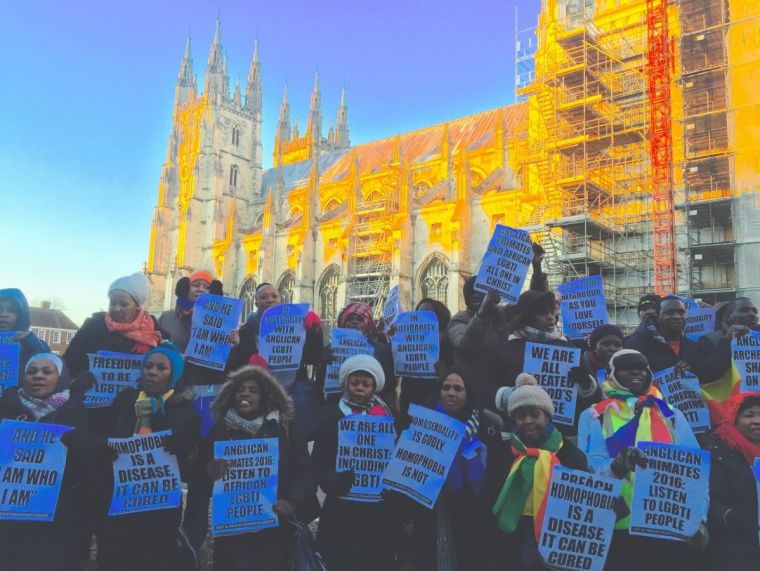'Sin is the same for all of us': Archbishops of Canterbury and York latest on gay sex

The Archbishops of Canterbury and York have made a statement on today's anniversary of the decriminalisation of homosexuality in which they state that sin 'is the same for all of us'.
Archbishops Justin Welby and John Sentamu say in their statement: 'Sin is not a characteristic of a particular group of people. Sin is the same for all of us. And the challenge to take onto ourselves the obligation to be yoked with Christ, to bear the load he gives us, is the same for all of us.
'This day of anniversary of the 1967 Act is one when the Church in this land should be conscious of the need to turn away from condemnation of people as its first response.
'When we rightly celebrate what happened 50 years ago today, we do so best by turning to him and saying, "Yes, we take your yoke on our shoulders with you."'
Referring to the primates meeting in Canterbury last year, the Archbishops say the leading Archbishops of the whole global Anglican Communion – almost 80 million people in 165 countries – confirmed at that meeting 'the longstanding view of the Communion that diminishing and criminalising homosexual people is wrong'.

The Archbishops continue: 'The Church, not just the Church of England, but all those who follow Jesus Christ and whose lives are committed to his worship and service, has very often been defined by what it is against. It has condemned many things, and continues to do so, very often correctly, for example when they involve the abuse of the poor, or the weak, or the marginalised.
'The Church is called more to be identified by what it loves, most of all by its pointing to Jesus Christ, not merely by what it condemns. Many people who have nothing to do with the institutional church and who seldom, if ever, attend it, nevertheless see in Jesus Christ someone of startling and extraordinary attraction. Many homosexual people follow Christ, drawn to him by his love and his outstretched arms welcoming all those who turn to him.
'One of the things he said has been much on our minds recently: "Come to me, all you who are weary and burdened, and I will give you rest. Take my yoke upon you and learn from me, for I am gentle and humble in heart, and you will find rest for your souls. For my yoke is easy and my burden is light" (Matthew 11:28-30).
'There is no human being to whom this does not apply. Every single one of us needs to lay our burdens on Jesus. For every single one of us, the burden that is most onerous, most difficult to bear, is the burden of what the Bible calls our sin, our failure to live as we ought, our continued falling short of the mark. It is the universal characteristic of being human that we are sinners.'
The statement prompted a mixed response from Anglicans at both ends of the spectrum.
Equality campaigner Jayne Ozanne told Christian Today: 'I must admit to being saddened and perplexed by the Archbishops' statement on what should be a day of clear celebration, and in the church's case – repentance. There are still many countries around the world that criminalise homosexuality, often with the Church's support. To talk about sin and "burden bearing" at a time such as this is at best misguided and at worse offensive to those of us who have constantly been told that our sexuality is a "burden to bear" and that any demonstration of it is "sinful".
'Unfortunately, I fear it shows just how far the Church still has to go in understanding the damage it has caused, and the pain it continues to inflict – unwittingly or otherwise.'
Comments on the Thinking Anglicans website reflected the deep divisions in the church on this issue.
Kevin Holdsworth, Provost of St Mary's Cathedral, Glasgow, wrote : 'Oh dear, Archbishops linking homosexuality with sin. Even saying that sin applies to everyone, this is deeply unhelpful in a statement on the decriminalization of homosexuality.'
He also tweeted: 'So much for a new tone from English Archbishops. I guess them being nice is over. Why is this all about sin?'
So much for a new tone from English Archbishops. I guess them being nice is over.
— Kelvin Holdsworth (@thurible) July 27, 2017
Why is this all about sin?https://t.co/qhKTvtRqMZ
Jeremy wrote: 'What a foolish statement. The mistakes here are legion. I think we're just going to have to ignore the Archbishops.'
And Susannah Clark, quoting the line, 'Sin is not a characteristic of a particular group of people Sin is the same for all of us,' asked: 'Yes, but do you regard sex between two men as a "sin"? If that is what the Church is still to teach, then all your other words are vacuous, patronising, and a side-stepping of your continuing prejudice and vilification of decent LGBT lives.'
Father David H said on Thinking Anglicans: 'The Archbishops have failed to interpret how the Comfortable Words are played out in practice. "Come unto me all who travail and are heavy laden and I will treat some of you differently because of our exemption from English Equality Law". Otherwise, this meaningless letter sounds very nice. It will stoke the ire of evangelicals for not condemning 'sin'; and offend supporters of same-sex marriage for forgetting to mention it.'
Gay cleric Jeremy Pemberton told Christian Today: 'It is unclear what the Archbishops are trying to achieve. Their language is opaque. Are they implying that being gay is a burden? Because it isn't - but it is made burdensome by the institutional homophobia of the Church of England towards its LGBTI members.
'Again, what is the paragraph about sin trying to say? Would a message for the Mothers' Union 150th anniversary have inlcuded a paragraph about sin? I rather doubt it. Then what is this paragraph doing? If the Archbishops had looked at the extraordinary drama/documentary Against the Law, shown on BBC2 last night, then what they would have heard was the testimony of a lot of elderly men who were more sinned against than sinning.'
Canon Dr Chris Sugden, convenor for Anglican Mainstream, told Christian Today: 'We welcome the Archbishops' reminder that the Church of England supported ending the criminalisation of homosexual behaviour among consenting adults, which is no more appropriate than criminalising adultery. We are also glad that they speak of homosexual people who want to follow Christ and are drawn by his love.
'However, in calling people to him, Jesus speaks of his yoke and burden not ours. He refers to the yoke or challenge of living the kind of spiritual and moral life he expects. He promises that if we follow him he shares the burden and challenge to enable us to overcome those aspects of our lives that still need to conform to his pattern and teaching. He does not comfort and console us by accepting what is unacceptable to him.
'Taking such a stand, yoked with Jesus' pattern and teaching, to live in accordance with his standards for marriage and sexuality which are plain and clear in the Bible should not be seen as passing judgement on or condemning anyone. Why might taking a stand on God's standards in challenge to the prevailing cultural preferences be seen as condemnation? If it is judged to be a condemnation, what is operating is not a moral approach but a political one that panders to the lobbies who will label as condemnation anything that questions their behaviour.'











